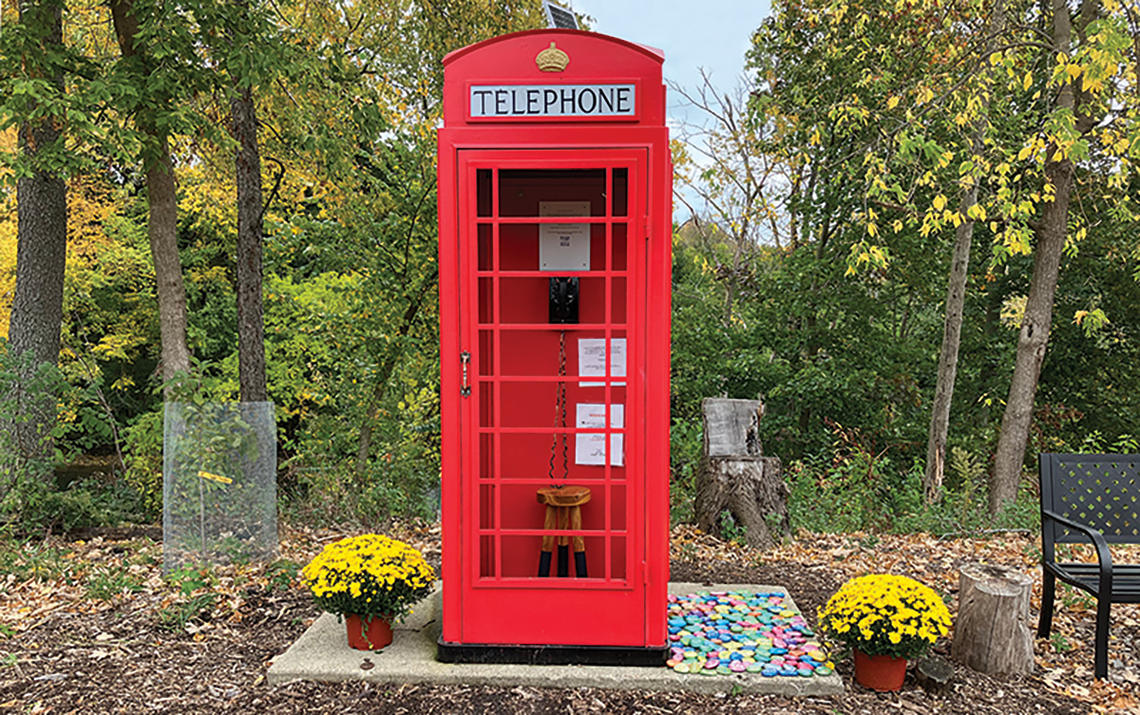
Our dimpled, beautiful son, Oliver, died on Dec. 9, 2021, at the age of 19. Perhaps there are no words in the English language to denote a parent who has lost a child because losing a child is so unspeakable, utterly out of order, and inexpressible in its depth of pain. Other cultures have terms to describe bereaved parents: Verwaiste eltern in German means “orphaned parents,” and thakla is the term used for a bereaved parent in Arabic. Can we assume that these cultures are more adept at naming the unnameable?
When I think of my 19-year-old self, I am immediately transported to my sophomore year at Princeton, where I experienced boundless curiosity, self-exploration (and the attendant challenges), intellectual expansion, and the inevitable peaks and shallows of young adulthood. It reminds me we lost both Oliver and the chance to stand by his side as he piloted his way into his own future.
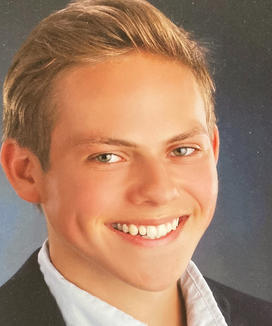
We do not have clear answers as to how Oliver died as all the reports were inconclusive. We did learn — six months of agony later — that he had several undiagnosed heart conditions which may have contributed to his death. Living with the uncertainty has been excruciating.
The grief over losing a child of any age is unrelenting and all-consuming. In the early months, I struggled with (re)defining myself, continuing to provide care for my psychotherapy clients while dealing with my own grief, being present for my surviving child, and completing regular tasks like grocery shopping.
I began thinking, how can I create such a space for grief to be welcomed, encouraged, and normalized?
To say that I have lost my child is not quite accurate: I have an ongoing, very active relationship with Oliver. Much of my energy is still directed toward mothering Oliver — loving him, preserving his memories, and continuing to ask, “How can I be of most help to others?” He guides me to strength and action.
I began thinking, how can I create such a space for grief to be welcomed, encouraged, and normalized? Our society does not encourage frank discussion of grief, nor are there places — outside of religious institutions and cemeteries — that openly welcome grievers.
Shortly after Oliver died, I learned about the concept of a wind phone and it deeply resonated with me. Itaru Sasaki, a Japanese garden designer, created the first wind phone (Kaze No Denwa roughly translated to the telephone of the wind) in 2010 after the death of his beloved cousin to cancer. He placed a vintage phone booth in his private garden with a nonworking rotary phone at its center. Sasaki continued to connect with his cousin by picking up the receiver and letting his words be carried by the wind. The following year, after a tsunami and earthquake destroyed towns and took the lives of more than 15,000 citizens, Sasaki moved the wind phone to a strikingly beautiful public space overlooking the Pacific Ocean in the town of Otsuchi. It was there that mourners could speak with their departed loved ones, many whose bodies were never recovered. Sasaki has since inspired the creation of wind phones all over the world with the sole purpose of holding space for grievers. Bringing a wind phone to my community of Evanston, Illinois, became my primary focus and a productive way to channel my grief.
With help and unanimous support from Canal Shores Golf Course, we were able to purchase (with funds raised in two days!) a replica of a British phone booth, which now rests on the 11th hole. Canal Shores, where famed actor Bill Murray learned to play golf, is a unique course: It crosses city streets and is flanked by a river, and trains run along its side. It is an inclusive, totally unpretentious space that hosts summer concerts, dog playdates, joggers, volunteer lumberjacks removing invasive species, and cross-country skiers in the winter months.
Since its placement in June 2023, many have sought out the wind phone to connect with their departed loved ones. To mark the second anniversary of Oliver’s death, we hosted a candlelight vigil at the phone booth as the sun was setting. People gathered in the summer months, relaxing in lawn chairs.
As I walk by these days, I often see people in the wind phone, receiver in hand. I am always breathless when I stumble upon grievers who have learned about it from our local newspapers, other therapists, clergy, and friends.
Volunteers and neighbors have tended to the wind phone in the loveliest of ways: A retired electrician placed a solar panel atop it to offer light in the darkness. He also created a gentle path leading up to the wind phone. A local artist painted a butterfly mural on the back to dissuade tagging.
I began a secondary project: painting the names of departed loved ones on rocks to place at the wind phone. Rock by rock, I imagine and honor a life. Priming, painting, decorating, sending a picture of the completed rock, and finally placing the rock are all tiny acts of love. I’ve completed several hundred so far, and plan to continue.
For many, seeing their loved one’s name displayed on a rock is an emotional moment of recognition and connection. The growing pile is a reminder that we are never alone.
In our culture, grief is often a solitary and isolating process. As a grieving parent, I want nothing more than to say Oliver’s name in conversation. No, it does not make me sadder than I already am. I am already thinking of Oliver every moment of every day.
The grief will always fill me, but/and I am learning to grow my life around Oliver’s death. The wind phone represents such an expansion around the pain of profound loss. The timing of this essay is fortuitous, as I’ve recently learned that Millet Israeli ’92 installed a wind phone at Princeton in concert with her 2023 Wintersession workshop, The Wind Phone: Words Left Unspoken and the Art of Loss (see sidebar).
Let us continue to say the names and tell the stories of our loved ones. Let us grieve without shame or judgment and connect around our shared losses. Let us place the rocks of our loved ones in every corner of our brutal and beautiful world. In the spirit of connection, I would love to hear your story.
Mary Leopold is a clinical social worker in private practice, specializing in the treatment of children and adults. She lives in Evanston with her family and menagerie of animals.
Princeton’s wind phone
A Tool for Healing
Millet Israeli ’92 has a lot of experience with grief. That’s why the grief therapist was recruited in 2022 to work on a memorial celebration for her class as part of its 30th reunion. She suggested creating a temporary wind phone — used to “call” loved ones who have died — on campus. The rotary phone on a makeshift podium was placed in Prospect Garden, where it stood throughout Reunions weekend.
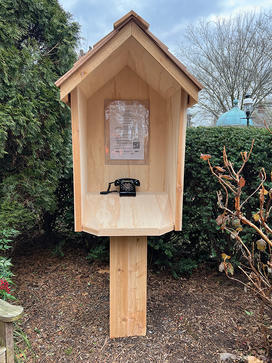
The project planted a seed — why not bring a permanent wind phone to campus?
“There had been a few suicides on campus, and just a general feeling that people wanted to pause and take a moment to tend to their losses,” Israeli says. She hoped the wind phone could be another tool to help students work through their emotional pain.
She has firsthand knowledge of the comfort it offers. After learning about the wind phone and its purpose, Israeli organized the installation of one along the Appalachian Trail in Fahnestock State Park in Putnam County, New York. That one was set up like a bulletin board, with the phone attached and a poem that reads in part, “Though I’ve lost you, I feel you here/In this shrine of trees in nature’s sanctuary.” Israeli also created an Instagram page (@wind.phone.ny) where people can share their experiences and stories with the wind phone.
This time she worked with student leaders Chioma Ugwonali ’24 and Stephen Daniels ’24, and many campus partners including the TigerWell program, which aims to support well-being on campus. Members of Princeton’s Carpenter Shop built a structure to house the rotary phone.
The effort bloomed around the time the University was looking for ideas for Wintersession classes, so Israeli signed up to teach a workshop titled The Wind Phone: Words Left Unspoken and the Art of Loss. In conjunction with the workshop, the new wind phone was unveiled — its new home is in the garden behind Maclean House.
You just pick up the receiver and talk, Israeli says. “I’ve had more than one person say, ‘I did not think that I would be able to do that.’” But it can be a powerful experience, she adds. “The wind phone, among other things that have sort of been born out of grief, can either create something beautiful or offer something beautiful to the viewer, the user, or the caller.”
By C.S.







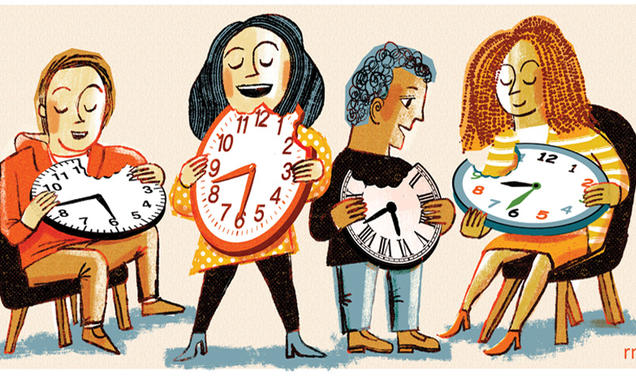
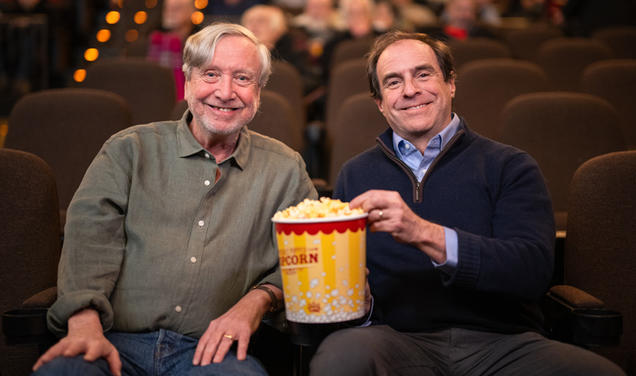

0 Responses